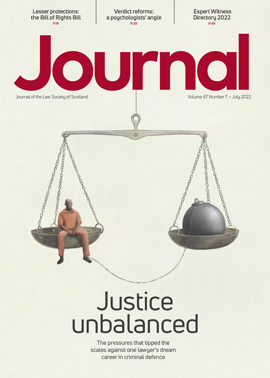Tradecraft tips
Guiding your clients
On occasion I have considered including in the narrative of a fee note: “To making your mind up for you”, where the client has been dithering about some matter much to my annoyance. On the other hand, a solicitor has to take their client’s instructions and cannot really dictate to them.
A client had a business that he was looking to wind up. The bank overdraft was secured not only against the business premises but also against the client’s house. The client was determined that the free proceeds of sale of the premises would be sufficient to clear the overdraft so that he would not have two securities on his house. The premises stuck on the market, and every time overdraft interest was applied the client was looking to receive a higher price. He did not appreciate that the open market value of the premises was not in any way linked to the size of his overdraft.
What I found incredible about the situation was that the mortgage on his house was less than £1,000, so why he could not have left say £10,000 of the business overdraft secured on the house and paid it off over a number of years as some sort of term loan was beyond my comprehension.
I was not directly involved in the matter, but if I had been acting I would have emailed the client summarising my view of the situation, making the appropriate suggestion, and asking in the most courteous and polite way: “Do you really know what you are doing here?” Doing this at a face-to-face meeting or on the telephone would not be the correct way, as there would be a danger of getting a response on an emotional rather than a rational level. Clients need to be left to ponder on such matters without feeling obliged to give an immediate response.
Part of the solicitor’s job is to be sure that the client knows all the options that are open to them. Some solicitors may be hesitant about suggesting alternative courses of action to clients that are contrary to their initial instructions, just in case something goes wrong and they have to take the blame, but you are doing your clients a disservice if you do not make them aware that there may be different ways of approaching the same situation.
Put it in writing
I was involved in a difficult case and the other solicitor phoned me to discuss the matter. I was worried about losing my temper with him so I asked the receptionist to tell him that I would only communicate in writing. I did not realise at the time how valuable this decision actually was.
The matter was later the subject of a third-party complaint, but when reviewing my file at least the SLCC knew that it told the whole story and there was nothing that did not appear in the file. The SLCC must often wonder if the file they are given to look at tells the whole story. In this case, it clearly did. The complaint was not upheld.
If you have an inkling that the matter in hand might have consequences in the future or be the subject of scrutiny by the authorities, it is worth considering having everything in writing either by letter or email. The added advantage is that in composing an outgoing email or responding to an incoming one you have time to think about what you are saying, and also time to ask someone else in your firm for their view. Not every solicitor is at their best on the phone or in a face-to-face meeting.
Holding on to the client
A client was selling her house and it was sticking on the market when other similar properties seemed to be selling quite readily. Month after month was going by and I was greatly concerned that the client would get the impression that we were doing nothing to assist with the sale, and end up asking another firm to take over the marketing. There was nothing wrong with the house; it was one of those cases where it was very difficult to work out why it would not sell.
Just to show that we were doing something, on three separate occasions I prepared a chart with information from the Aberdeen Solicitors Property Centre giving details of all similar houses sold in the recent past or currently for sale, with details of how the selling price or asking price related to the survey value in the home report and how long each property had taken to sell or had been on the market. This did nothing at all to secure an eventual sale, but at least I was engaging both with the client and with the market and the client could not gain the impression that I was indifferent to the situation.
Sometimes in a long drawn-out matter you simply have to get some “joined-up writing” out there, even if it is only to confirm to your client that nothing is happening and that you are trying to make something happen.
Does size really matter?
For many years, I worked for a sole practitioner, but if I was wrangling with a much larger firm about something I was never particularly fazed by this. If the other firm had 15 partners, I thought that if you took away the court partners, the executry partners and the corporate partners you might be left with only four or five conveyancing partners, and the ones not involved in the matter at hand might take the view that they already had enough work and they did not need to spend hours on another partner’s work. More often than not it was me on one side and only one solicitor on the other.
A client of the firm died. He had operated a one-man accountancy business, and a small two-partner accountancy firm wanted to take over the client base. One of the partners said to me: “These huge international accountancy firms can solve any accountancy problem anywhere in the world. They have the resources to do these things, but the man running the corner shop does not need this. All he needs is someone to prepare his accounts and check his income tax assessments. We can do this and we are not carrying enormous overheads in the process.”
Do not feel intimidated if the other firm is much larger than yours. This does not make their client’s case any better than it would otherwise be, and it does not mean they are any better at dealing with the matter than you are. In many cases, the larger firm has no more ability or resources than you have.
Festina lente (Hasten slowly)
Twice in the recent past, other solicitors seemed to be trying to hustle me into fixing what I considered to be an impossibly short settlement date. What perplexed me about this was that both transactions had been dragging on for months, and in neither case would the clients be moving into the properties on settlement day. While I do not want to be inconveniencing other solicitors or their clients, there is seldom any reason for making a rod for your own back. Often if you try to give one transaction top priority you are throwing two or three others out of joint in the process. The only time when you should be flooring the accelerator pedal is when there is a genuine reason why the transaction needs priority or there has been some want of attention on your part which needs to be compensated for.
The golden hour
Everyone has their own way of working. Some people need coffee poured into them first thing in the morning before they are up to speed. Unless there is some urgent matter requiring immediate attention, I start most days with what I call the golden hour and deal with such incoming emails as require only a few minutes’ work or do whatever else I feel like doing (provided it is chargeable work), before settling down after 10am to matters requiring longer periods of attention.
Entering the dragon’s den
In a firm I worked for after qualifying, one of the partners managed somehow to operate the client account without going through the cashroom. The cashier came up to his room and literally threw him out through the window, partner or no partner.
Never, repeat never, fall out with the cashroom or take liberties with them. Make sure that you are fully conversant with the Law Society of Scotland rules about holding funds for clients, and never break them no matter how much pressure you may be under to settle a transaction or to do anything which requires money to be paid out of the client account.
Perspectives
Features
Briefings
- Civil court: Issues on appeal
- Licensing: Minimum pricing – a genuine impact?
- Insolvency: How to admit joint creditor claims
- Tax: windfall and plastic packaging taxes raise stakes
- Immigration: Asylum system overhauled
- Scottish Solicitors' Discipline Tribunal: July 2022
- In-house: In with the stonework
- Property: Living with the Register of Overseas Entities
In practice
- OPG update: July 2022
- Public policy highlights: July 2022
- Gear up for the Scottish Legal Walks
- Disabled solicitor support group proposed
- Risk: Cybercrime – the hybrid worker prey
- Ask Ash: Piling it on
- TRS: time for a trusts trawl
- Know people, know business
- High street and hybrid
- Appreciation: Ian Leslie Shaw Balfour
- The Expert Witness Directory 2022
- Expert witness: case law update







